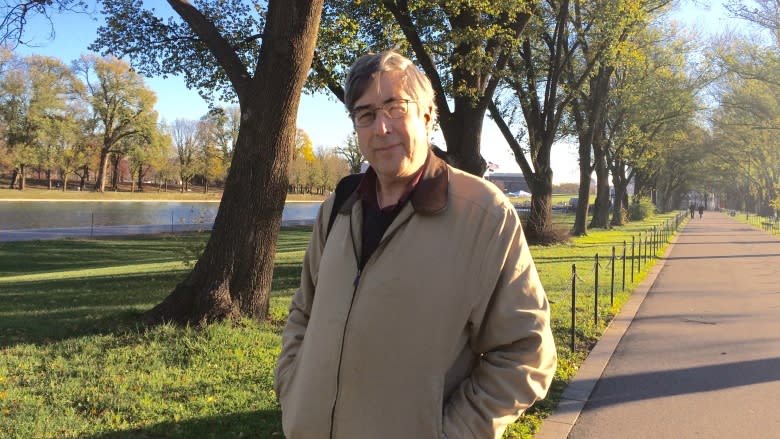Washington's National Mall deploys border collies to shoo pooping Canada geese
Washington's National Mall, with its rolling lawns, water features and stone monuments, serves as a symbol of American strength and reflection. But its less-than-stately utility as an open toilet for flocks of wild Canada geese has long irked the National Park Service.
Not anymore.
Seven months ago, the Park Service launched a program that uses dogs with "wolf-like" stares to scare away the flying pests, and the amount of Canada geese excrement has — well, dropped. Quite dramatically, in fact.
According to Michael Stachowicz, the turf management specialist for the Parks Service, the "Geese Police" project to deploy border collies to shoo away the nuisance birds has managed to keep the National Mall grounds "100 per cent goose-free, 95 per cent of the time."
Mall-stroller Todd Bethel has noticed a difference, too. Lately, he's been able to roam more freely without fear of treading in the wrong spot.
"It used to be you'd have to be pretty careful where you were walking. You didn't want to step in it. The goose doodee," said Bethel, a computer programmer who takes weekday morning walks along the Lincoln Memorial Reflecting Pool to work.
'Slippery' hazard
Before Stachowicz inked the five-year, $30,000-per-year contract with Geese Police, he said "slippery droppings" on the walkways had become a pedestrian hazard. Also, unsightly algae blooms were forming in the Reflecting Pool. And forget about trying to lie down on the lawns near Constitution Gardens.
"I would argue they were not that usable as far as picnicking or ground sports," Stachowicz said.
According to park officials, goose droppings became so problematic that the fecal matter was clogging the pumps and filters for the Lincoln Memorial Reflecting Pool.
When Doug Marcks, the co-owner of Geese Police and "modern-day shepherd," first began patrolling the John F. Kennedy Hockey Fields near the reflecting pool, the lawn was "decimated" by geese having torn the grass from the roots, he said.
"Normally they're right there by the lake," Marcks said on a recent patrol at the JFK field hockey grounds with his brother, Dave, and their Geese Police border collies Belle, Tupac, Max and Scott.
Border collies are ideal for the job, Marcks explained, because they have "a wolf-like glance" known as "the eye" — an intimidating glare and posture (head down, tail between the legs) that tricks geese into believing them to be a natural predator such as the Arctic fox.
As the geese are not truly in danger, and no chemicals are used, Geese Police's methods are endorsed by the Society for the Prevention of Cruelty to Animals and People for the Ethical Treatment of Animals.
"When we started, they would fly right over the reflecting pool and land right here in this field. There were about 100 or so that would stay over in that pond," Marcks said.
'Little poop machines'
Lara Levison, who bikes most days to work, said she used to routinely spot large flocks of geese around Constitution Gardens.
"I've stepped in a few geese splatters," she says. "They'd be on the sidewalk, so you really had to watch where you stepped when you were walking around there."
A single goose can leave as much as three pounds of excrement in a day.
"They're just little poop machines," Marcks said. "And it takes just eight minutes from their bill to their butt."
He fell into a hush as a flock honked overhead in a V formation.
"I just heard one. There they are, flying over us."
Although Canada geese can still be reliably spotted around the pond at Constitution Gardens, not one bird landed on the JFK field hockey grasslands during a patrol with Geese Police last week.
It seems the geese have become conditioned to recognizing the site as unwelcome territory, Marcks explained. But it can take as long as eight weeks to achieve that kind of conditioning.
Canada geese (Branta canadensis) are native to Arctic and temperate climates in North America, but the particular birds targeted by Geese Police are likely resident geese that don't migrate very far.
So as effective as the Park Service's methods may be for ridding them from one of Washington's most cherished properties, even Geese Police concede the service does not solve what amounts to an overpopulation problem.
As the Park Service's Stachowicz notes, the program has effectively "pushed the problem to other parts of the park."
A greater conversation needs to be had about addressing the rising goose population, he said.
"Not just with the Park Service, but everybody in wildlife management — because the Migratory Bird Act was good in getting people to protect these birds, but it got a lot more successful than anybody expected."



